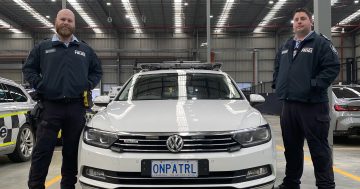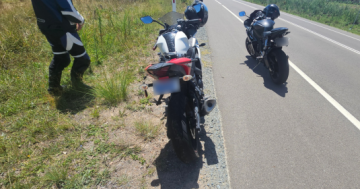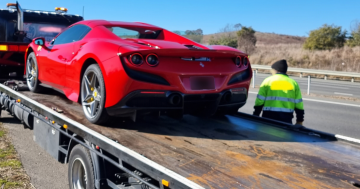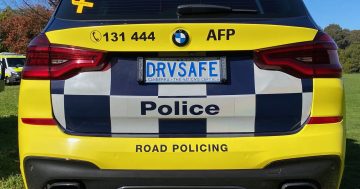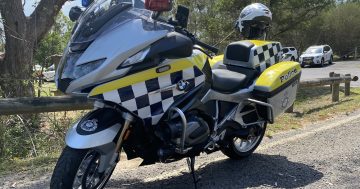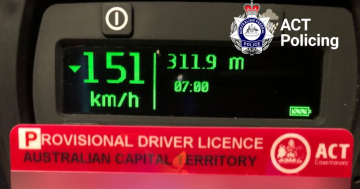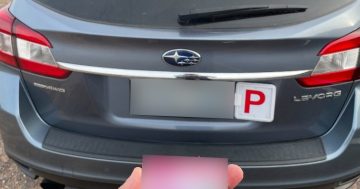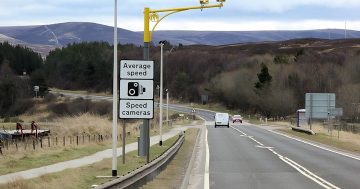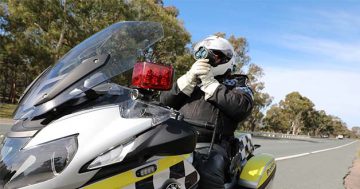
ACT Policing has again called on Canberra drivers to slow down after a spate of high-range speeding incidents over the weekend. Photo: ACT Policing.
Questions have been raised about whether high-range speeding infringements in the ACT should result in on-the-spot licence suspensions after a driver travelling at 214km/h along the Majura Parkway over the weekend was able to drive home.
ACT Policing has repeatedly expressed frustration at drivers over a spate of high-speed infringements across the Territory during the pandemic, but the Government has refused to commit to tougher penalties in the Territory.
The top tier speeding offence – speeding at more than 45 km/h over the limit – attracts a $1841 fine and six demerit points, but police cannot suspend a driver’s licence on the spot.
Across the border, NSW Police can immediately confiscate a driver’s licence at the roadside for six months for exceeding the speed limit by 45 km/h.
In NSW, the car may also be impounded, repossessed or have its number plates confiscated if the driver is caught exceeding the speed limit by more than 45 km/h, while travelling 30 km/h over the speed limit carries an instant three-month disqualification.
Mandatory suspension periods and car impounding and repossession are also in place in Victoria.
While the ACT Road Safety Minister Shane Rattenbury expressed his disappointment at ACT drivers who continue to flout road rules, he did not commit to tougher penalties such as mandatory suspensions.
“I am really staggered at some of the numbers we are seeing in terms of the speed people are doing. It is incredibly irresponsible,” he said.
“We are currently reviewing the ACT’s road safety strategy and one of the things we will be looking at is a review of the penalties for speeding. It is clear that some people in the community are just not getting the message.
“We will be looking at a range of penalty options to further provide incentives for people to do the right thing.”
The Road Safety Action Plan review is set to wrap up in the coming months as the current strategy expires at the end of this year.
Officer in Charge of Traffic Operations, Detective Inspector Marcus Boorman said tougher penalties should be put on the table by the ACT Government, but refused to comment on what specific measures ACT Policing would recommend.

Detective Inspector Marcus Boorman called the high-range speeding offences “disgusting and indefensible”. Photo: Dominic Giannini.
“ACT Policing will continue to work with Government,” he said. “In other states and territories there are harsher penalties and consequences, now we need to look at those [and] consider those.
“Legislative reform is a matter for government. We will be examining what is going on in other jurisdictions, providing the data and the information to the ACT Government and the ACT Government can determine what the penalties are.
“Speed cameras are one way of dealing with excessive speed but when you look at it, it is about driver behaviour and about people being responsible themselves. If enforcement was the key answer to this, we would have solved the problem a long time ago.”
Minister for Police and Emergency Services Mick Gentleman said he would discuss the matter with Mr Rattenbury, but did not commit to legislative reform. However, Mr Gentleman said the Government would act on police feedback as it did with the new police car ramming laws.
“We will have to look at the amount of events we see occur. We have seen a spike in high-speed occasions over the last couple of weeks, and indeed during the COVID incident we have seen more speeding across the ACT,” he said.
“Our speed limits are appropriate across the ACT. People do not need to be speeding and if they are caught there are severe fines and penalties.”












